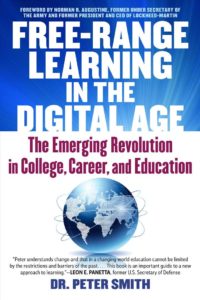 The UPCEA 2019 Phillip E. Frandson Award for Literature has been awarded to Peter Smith’s latest book, Free-Range Learning in the Digital Age: The Emerging Revolution in College, Career, and Education. This award recognizes newly published works that contribute to the theory and/or practice of professional and continuing higher education. The committee unanimously agreed on this text written by leading adult educator and innovator, Dr. Peter Smith. At the age of 24, Dr. Smith served as the founding president of the Community College of Vermont. In his distinguished career, he also served as founding president of California State University Monterey Bay (CSUMB), and as Lieutenant Governor of Vermont and member of the U.S. House of Representatives from that state, giving him a unique perspective on how to solve the difficult issues facing higher education today. After 45 years in the field, he currently serves as the Orkand Chair and Professor of Innovative Practices in Higher Education, University of Maryland University College, which has long been at the forefront of creative and professionally relevant education programs for adult students. This book is a must-read for those who serve adult learners, both at the policy and practitioner levels, as well as for adult learners themselves who have hit what might be called the parchment ceiling—the lack of a college degree. The book is organized into three sections and nine chapters that include a wealth of information from numerous innovators of the digital age, political leaders, creative thinkers, and leaders in higher education. Most importantly, the book features poignant interviews of adult learners who share their very powerful personal stories.
The UPCEA 2019 Phillip E. Frandson Award for Literature has been awarded to Peter Smith’s latest book, Free-Range Learning in the Digital Age: The Emerging Revolution in College, Career, and Education. This award recognizes newly published works that contribute to the theory and/or practice of professional and continuing higher education. The committee unanimously agreed on this text written by leading adult educator and innovator, Dr. Peter Smith. At the age of 24, Dr. Smith served as the founding president of the Community College of Vermont. In his distinguished career, he also served as founding president of California State University Monterey Bay (CSUMB), and as Lieutenant Governor of Vermont and member of the U.S. House of Representatives from that state, giving him a unique perspective on how to solve the difficult issues facing higher education today. After 45 years in the field, he currently serves as the Orkand Chair and Professor of Innovative Practices in Higher Education, University of Maryland University College, which has long been at the forefront of creative and professionally relevant education programs for adult students. This book is a must-read for those who serve adult learners, both at the policy and practitioner levels, as well as for adult learners themselves who have hit what might be called the parchment ceiling—the lack of a college degree. The book is organized into three sections and nine chapters that include a wealth of information from numerous innovators of the digital age, political leaders, creative thinkers, and leaders in higher education. Most importantly, the book features poignant interviews of adult learners who share their very powerful personal stories.
Book Summary
In the opening section, Understanding Your Personal Learning and Hidden Credentials, Smith introduces the concept of personal learning, which includes the sum total of one’s knowledge and skills, most of which is gained outside of formal education. As noted in Chapter 1, “Hiding in Plain Sight,” schools and employers too often fail to value that personal knowledge because it is “uncredentialed,” or, in effect, a “hidden credential.” In Chapter 2, “Turning Points and Transitions,” Smith looks at how various turning points often drive one’s personal learning, thus resulting in the need to change and seek education, credentials, or new employment. Vivid stories of adult learners provide a clearer understanding of the validity and power of personal learning.
The second section, Eliminating Barriers to College, includes three chapters: (Chapter 3) “The Scarecrow’s Dilemma,” (Chapter 4) “Adult-Friendly Colleges,” and (Chapter 5) “Adult-Friendly College Presidents Speak.” This section includes interviews with people who share their own life stories and the many barriers encountered that block access to learning as well as to careers. Common barriers such as “unfriendly” college practices and bewildering job requirements are discussed. Smith explores the many efforts that “adult-friendly colleges” have made to reduce or eliminate such barriers, and he provides extensive interviews with thought leaders in adult education who are now serving as college and university presidents.
The third section, The Emerging GPS for Learning and Work, includes four chapters: (Chapter 6) “Cracking the Code: Getting to the Right College or Credentials”; (Chapter 7) “Getting the Skills You Need”; (Chapter 8) “New Tools for the New World of Learning and Work”; and (Chapter 9) “The Innovators Speak: Visions of a New World of Learning and Work.” Smith uses the analogy of the GPS travel application as a way to get from where you are to your educational and career destination in the most efficient and direct way possible. Digital learning and credentialing are opening new pathways, which can provide access and learning routes for people who otherwise might be left out. Smith uses “free-range” to describe such learning because individuals can now take control of their own learning, as they move in and out of formal schooling and expand their personal knowledge over the course of their lifetime. In this new era, all kinds of personal learning can now be recorded, credentialed, and shared, equipping people to advance in their careers with or without a college education. Adult learners who seek new opportunities in their jobs or career can find a road map here to a future that will matches their skills, interests, and knowledge. Leaders in adult and professional education can learn from this same road map to pursue new strategies to overcome barriers and to harness technology to better serve the needs of our students.
Connection to Professional and Continuing Education Providers
Meeting the needs of adult learners is at the very core of the professional and continuing education mission. In fact, it is the heart and soul of every leader in the field. This book is a vivid connection to professional and continuing education in three key ways. First, professional and continuing education leaders have always been in the forefront of leading change related to access and adult learning—from the history of the old correspondence courses, to educational television, to videoconferencing, to online education, to prior learning assessment to competency-based learning, and other innovations over time. Thus, professional and continuing educators in an ever-changing world will benefit from this book as an important guide to new approaches to learning. Second, as the learner continues to be in the driver’s seat during this age of online and alternative resources, continuing and professional educators can adapt to these opportunities in order to serve learners much more quickly and be more nimble than other arms of traditional higher education institutions. This book provides many examples of opportunities for serving the free-range learners of this age, as well as the opportunity to provide leadership for traditional institutions to move them forward in new ways of doing business. Finally, professional and continuing educators have always been leading innovators in higher education, and they can continue to embrace the many types of innovation provided by those cited in the book with visions of a new world of learning and work, They can continue to be leading innovators themselves in the emerging revolution in college, career, and education.
Susan Elkins, Ed.D. has served in leadership roles in continuing and professional education for three decades. She was a member of the Frandson Award Committee in 2018 and served as Chair of the 2019 Frandson Award Committee. Susan is Chancellor of the University of South Carolina Palmetto College, a new USC system innovation that includes four two-year Regional Palmetto Colleges – USC Lancaster, USC Salkehatchie, USC Sumter, and USC Union – along with online bachelor’s degree completion programs from the Research I institution in Columbia and the three comprehensive universities, USC Aiken, USC Beaufort, and USC Upstate. USC Palmetto College received the UPCEA South Region Program of Excellence Credit Award in 2018.

